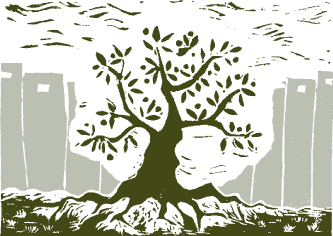Chloe’s story
Chloe has recently joined our Young Advocates Forum and our monthly prayer gathering. Ruth, our under 35’s officer interviewed her about her interest in Palestine, and how she came to know about Sabeel-Kairos.
Chloe, how did you become interested in Palestine?
As a little girl, I enjoyed flicking through my grandparent’s slides of Al-Quds, and listening to stories of their visits. Olive trees, the Garden Tomb, the golden dome of Al-Aqsa mosque – I couldn’t get enough of hearing about this place. But my family were Zionists. It wasn’t overt, but in that subtle way that sees the state of Israel as a holy place, a fulfillment of God’s promise to Abraham. The end times was never far from our thoughts and conversations, and always centred around Jerusalem.
As a teenager, I voraciously read the news and began to question this narrative given to me by my family of a ‘holy nation’. What was so holy about apartheid? One RE lesson, my teacher broke down the political situation in the region, introducing me to the difficulties faced by Palestinians, and after a chance encounter with Stephen Sizer’s ‘Zion’s Christian Soldiers’, I began to question Zionist theology.
How did you hear about Sabeel-Kairos?
At university, I read more and more about the situation Palestinians were facing on a day to day basis. A tutor pointed me to the Sabeel-Kairos document, ‘A moment of truth’. The call on churches and Christians to respond to the apartheid in Palestine was immense, and I found it both deeply challenging and motivating. After a visit to the West Bank and Jerusalem, I wrote my dissertation on the document, using it and writings of Naim Ateek and others, alongside careful study of scripture, to unpick and correct the Zionist theology I had grown up with.
What have you done with Sabeel-Kairos since hearing about the organisation?
Monthly, I have been joining with the under-35 network at Sabeel to pray for Palestine and the Palestinian people. When you see images of suffering and pain, to bring them before God with others who encourage you to keep praying and keep you accountable to pray stops you from checking out and becoming numb to the situation.
How does that affect your advocacy/heart for Palestine?
After graduating and entering ‘normal adult life’, it was hard to know what to do with the feelings of sadness and frustration and to be accountable for the images I was seeing coming out of Palestine. Joining with Ruth and others to pray has helped me bring the situation to God, reminding me He is in control. The prayers of others inspire and encourage me to pray more, and it is humbling to remember all those who have prayed and fasted for peace before me. Now, I find it easier to challenge Zionist theology, to talk about Palestine and advocate for Palestinians to those around me, whether in my workplace, church, or with my friends. I don’t feel powerless anymore, but know I am part of a global community of prayer.

